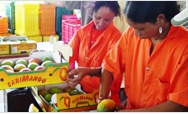You are here » Home » Telling Our Story
Success Story
A volunteer teaches lab technicians modern and rapid food safety tests
Food Safety Techniques Improve Health

| |
Photo: Winrock International
|
|
Dr. Stephen Pao, left, teaches microbiology testing techniques to Zorayda Villalta, a laboratory technician at the Laboratory of Integral Quality in San Salvador.
“It was a wonderful experience, we are now highly motivated to work after Dr. Pao’s visit,” said Ana Delmi de Melara, chief of the Laboratory of Integral Quality’s Microbiology Unit.
|
With a climate and soil ideal for agriculture, El Salvador’s farms have long provided Salvadorans with income, jobs, and food. They grow the corn, rice, beans, and sugar cane that are staple ingredients in Salvadoran cuisine. But there is one ingredient that has often been missing in the country’s agriculture sector: consistent food safety and quality standards. That’s where the USAID-funded Farmer-to-Farmer program comes in.
With USAID assistance, volunteer Dr. Steven Pao, a professor at Virginia State University, came to El Salvador to train technicians in new methods and techniques for food safety analysis. The workshop, held in the Santa Elena neighborhood of San Salvador at the Laboratory of Integral Quality, part of the Salvadoran Foundation for Economic and Social Development, included lectures on food microbiology, discussions, and practical training to more than 35 participants from private food companies, university labs, local organizations, and governmental offices. They received practical training on microbiological detection and investigation. Many of the topics covered were new to participants, and the workshop provided a good opportunity to boost public awareness of the importance of food safety and quality. In fact, local media interviewed Dr. Pao, reaching an estimated 350,000 readers through the newspaper alone.
The lab’s focus on food safety is part of its effort to improve Salvadoran health, but there is also a business aspect: if food companies can comply with international food safety standards, they will be able to export more products, bringing added income into the country. With the passage of the Central American Free Trade Agreement, the potential for added income is significant.
Workshop participants reflected this potential through their interest and enthusiasm. “It was a wonderful experience, we are now highly motivated to work after Dr. Pao’s visit,” said Ana Delmy de Melara, chief of the lab’s microbiology unit. Since the workshop, the Integral Quality Lab has implemented all of Dr. Pao’s recommendations. With fast and reliable microbiology tests that give clients quick answers, both the food industry and Salvadorans are benefitting.
Print-friendly version of this page (422kb - PDF)
Click here for high-res photo
Back to Top ^ | 

